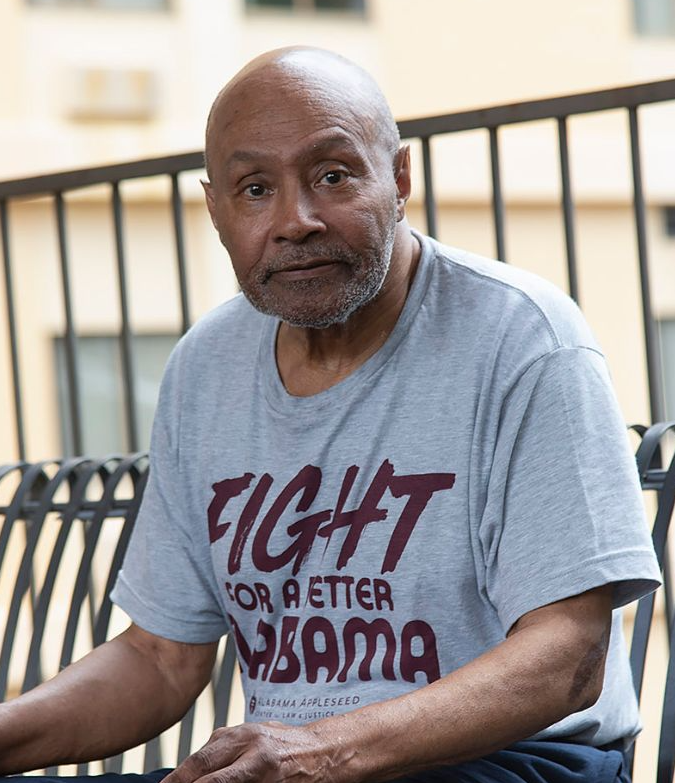
alabamaappleseed.org
Robert Cheeks, who was originally sentenced to die in prison under Alabama’s Habitual Felony Offender Act for a 1985 robbery conviction, was released on time served after being represented by Alabama Appleseed, a nonpartisan research and advocacy organization working exclusively on justice system reform in Alabama.
He is Appleseed’s eighth client – originally sentenced to life without parole – to be released from prison since 2019. He walked out of Donaldson Correctional Facility on July 22 after 37 years of incarceration.
On Saturday, September 10, he turned 80 years old.
Appleseed attorneys determined that under current Alabama law, he would have been eligible for parole in 1994. Given this fact, along with his age and medical condition, Appleseed filed an unopposed petition for post-conviction relief in Jefferson County, where District Attorney Danny Carr recognized the excessiveness of this sentence and Circuit Judge Shanta Owens granted the motion.

“I would tell myself, ‘don’t give up, don’t give in, and don’t give out under any circumstances.’ That was my motto,” said Cheeks, who worked in the prison kitchen for 30 years with no pay. “I never thought I would get out. I thought I would be deceased at Donaldson, but the Lord spared me and here I am.”
In 1985, Cheeks received a mandatory sentence of life without parole after being convicted of robbery in which no one was physically harmed. Because of his priors – non-violent offenses including three forgeries that occurred in 1969 – the judge had no choice but to impose a sentence pursuant to Alabama’s Habitual Felony Offender Act, one of the harshest “three strikes” laws in the nation.
Cheeks’ case exemplifies the unintended consequences of Alabama’s overreliance on life imprisonment.
“There was no legitimate, public safety reason for the State of Alabama to keep Robert Cheeks locked up so long,” said Appleseed Executive Director Carla Crowder. “These extreme sentences are expensive, wasteful, and cruel. I’m grateful that our elected officials in Jefferson County were willing to help right this wrong.”
The Alabama Legislature passed significant sentencing reforms in 2006, 2013, and 2015 resulting in a decrease in younger people being sent to prison. However, these reforms were not retroactive, resulting in an increase in the numbers of older, incarcerated people.
In 1972, there were 181 individuals over the age of 50 in Alabama’s prisons. That number now exceeds 6,750. Since 2000, the population of prisoners aged 60 and above grew from 85 to 2,393. Older prisoners have quickly shifted from a small group on the fringes to nearly a quarter of Alabama’s entire prison population.
Cheeks celebrated his release day with a requested lunch of a cheeseburger and a milkshake. Shepherd’s Fold reentry ministry temporarily provided housing Cheeks while Appleseed secured his Social Security and Medicaid. Cheeks currently resides in a skilled nursing facility where Appleseed staff continues to assist with his re-entry support.
Appleseed Staff Attorney Alex LaGanke worked with Legal Intern Brenita Softley, then a third-year law student at the University of Alabama School of Law, on this case. Reentry Coordinator Ronald McKeithen, along with Social Worker Catherine Alexander-Wright and Attorney Scott Fuqua have assisted Cheeks in his re-entry.
Alabama Appleseed Center for Law and Justice is Alabama’s only nonpartisan research and advocacy organization working exclusively on justice system reform in Alabama. Appleseed focuses on four issues of urgent need including economic justice and the criminalization of poverty, mass incarceration and Alabama’s chronically unconstitutional prisons, racial justice and systemic racism in laws and policies, and unaccountable government and policing for profit. The organization confronts these challenges with research, policy change campaigns, coalition building, and direct action.
Learn more at alabamaappleseed.org.
Updated at 6:12 p.m. on 9/12/2022 to delete a sentence that repeated.




